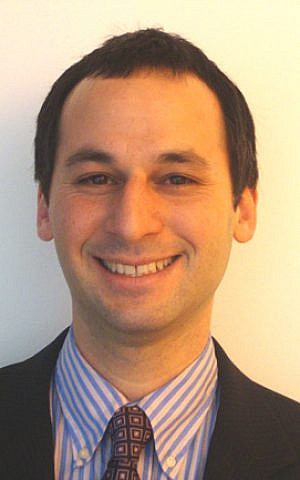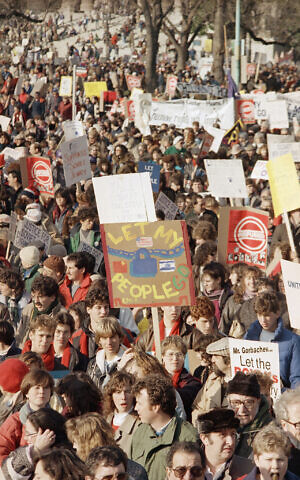WASHINGTON (JTA) – Israel will feature prominently in a Jewish organizational rally against anti-Semitism, in a bid to unite the Jewish community following a wave of attacks.
But the rally’s message on Israel led a number of left-wing Jewish groups to drop out of participation. This is a signal both of the seriousness of an issue that Israel remains in the American Jewish community and of the community’s division over whether and when to classify attacks on Israel as anti-Semitism.
Elisha Wiesel, son of the late Holocaust columnist and Nobel Peace Prize winner Elie Wiesel, was instrumental in bringing together a wide range of groups for the rally on Sunday, which will be held outside the United States Capitol in Washington, DC The rally is called “No Fear: A rally in solidarity with the Jewish people.
Wiesel said it was essential to make attacks on Israel, and not just anti-Semitism, a goal of the rally. The anti-Semitic attacks in American cities that occurred during and after Israel’s conflict with Gaza in May were interlinked, he said.
“Bombs were falling on our brothers and sisters in Israel, and we were attacked in the streets of New York and the restaurants of Los Angeles,†Wiesel told the Jewish Telegraphic Agency. “I made a wish for myself, the next group that raised their hand, I would call them up and offer to raise funds. “
The group that approached him was a relatively unknown new group, Alliance for Israel, founded in 2019 by Melissa Landa, a pro-Israel activist and former education teacher.
Landa, who declined an interview request, initially only had a handful of groups, mostly right-wingers, who registered to join the rally. Wiesel played a key role in recruiting traditional Jewish groups. The organizers also brought in Steve Rabinowitz, a public relations specialist with extensive experience working for Democrats, Jewish groups and progressive groups.
Elisha Wiesel attends the 2019 Blue Card Annual Benefit Dinner in New York City on April 8, 2019 (Aurora Rose / Patrick McMullan via Getty Images via JTA)
Now a who’s who of established Jewish organizations has become a cosponsor. They include the three major Jewish denominations, the Jewish Federations of North America, the Anti-Defamation League, the American Jewish Committee, and major Republican and Democratic Jewish groups.
“The precipitous increase in anti-Semitic attacks across the country, some violent, linked to growing protests against Israel, cannot be ignored,†said Alan Ronkin, director of the American Jewish Committee for the Washington, DC area, in a statement. E-mail. “Anti-Semitism is a social issue, and the No Fear Rally will bring together the Jewish community and our allies to jointly express their outrage and demand meaningful action. “
But Rabinowitz said he hit a brick wall with a few big left-wing organizations – including J Street, T’ruah and Americans for Peace Now, who declined invitations to co-sponsor the rally. A number of other left-wing groups whose representatives declined to speak officially got wind of the rally through email solicitations and decided not to attend.
Rabinowitz said Israel has become too divisive an issue among Jews, and he wished organizers would choose to focus solely on anti-Semitism in order to create a more powerful message.
“We can have an agreement on anti-Semitism, but there are a million differences over Israel,†he said. “I wish we could leave this debate for another day.”
A spokesperson for J Street declined to comment on the group’s reasons for not participating.
Hadar Susskind, president of American for Peace Now, said the gap was too wide between groups like his and right-wing sponsors like the Zionist Organization of America and StandWithUs.
“It’s not just that we disagree with these groups on other issues, we disagree with these groups on this issue,†he said, referring to how we define the anti-Semitism.
He cited as an example how these groups describe Israel’s boycott, divestment and sanction movement, known as BDS, as anti-Semitic. The main organizer, Alliance for Israel, mentions “the destructive anti-Semitic lies of the BDS movement” on its “About Us” page.

Hadar Susskind (courtesy)
Susskind said his group does not support BDS, but objected to defining it as anti-Semitic. “This rally appears to confuse criticism of the occupation and criticism of Israeli actions with anti-Zionism, and will say that anti-Zionism is anti-Semitic, and we do not want to be part of it,” he said.
The feeling that the organizers confused criticism of Israel with anti-Semitism was the reason a number of other left-wing Jewish groups did not sign, according to people familiar with the co-sponsorship process. Insiders said a number of groups were appalled by the posters that one of the sponsoring groups, the Israel Forever Foundation, distributed along with the rally’s advertisement: West Bank, without distinction between entities.
Still, a number of progressive and centrist groups have signed on, including member organizations of reform and conservative movements, the Jewish Democratic Council of America, and the National Council of Jewish Women. The Jewish Council for Public Affairs, which advocates liberal policies at the national level, is a sponsor, as are a number of its constituent Jewish community relations councils. Rabbi David Saperstein, a respected reformist leader and former religious freedom ambassador appointed by Barack Obama, is a speaker.
Jewish Democratic Council Chairman Ron Klein, a former congressman from Florida, will appear jointly with Republican Jewish Coalition Chairman Norm Coleman, a former senator from Minnesota, to demonstrate unanimity in the fight against the anti-Semitism.
That’s a big win for the rally, as in recent years the two groups have incessantly torn each other up on social media, each accusing the other of soft-pedaling anti-Semitism on their side of the aisle.
In interviews, Klein and Coleman said they saw value in Wiesel’s argument about unity in the face of a common threat.
“Democrats and Republicans should do what we can to end the scourge of anti-Semitism, to slow it down where it grows,†Coleman said.
Klein called the gathering a “manifestation of common interest.” Like Coleman, he said every party should be responsible for speaking out against anti-Semitism within its ranks. “Political parties are no different from others, we have to make sure that anti-Semitism is stifled and not the norm in the United States,” he said.
Wiesel said his red lines were right-wing extremists calling for the expulsion of Arabs from Israel and anti-Zionists. “We don’t want haters and we don’t want one-states,†he said. “If you are a Kahanist, or if you say it doesn’t matter if Israel leaves, you are not welcome.

Participants in the rally of Soviet Jews carry placards as they march Sunday, December 7, 1987 in Washington. The group calls for the unrestricted emigration of Jews from the Soviet Union. (AP Photo / Ira Schwarz)
He said not to expect the crowds that Jewish gatherings have historically drawn to the National Mall, noting the 250,000 people who allegedly attended a 1987 rally for Soviet Jews and the more than 100,000 who gathered. in 2002 when Israel was in the grip of the second Intifada. . Elie Wiesel attended both of these gatherings.
“There are a lot of things that are not ideal about this rally,†including the relatively short notice, he said. “Do anything in DC on a hot Sunday with all the kids in the camp [and] so many people on vacation were never going to be easy.
But he said that after years of division over Israel, it was essential that the Jewish community come together and project an agreement that Israel is essential to Jewish security, regardless of organizational differences over the actions of its organization. government or its borders. Jews had been torn apart in recent years by disagreements over the Iran nuclear deal brokered by former US President Barack Obama, and then by the way Trump and Prime Minister Benjamin Netanyahu politicized support for Israel, said Wiesel.
“After the Iran deal completely divided us under Obama, and after four years of Netanyahu and Trump making people feel uncomfortable with Israel, we lost the idea that he there should be an Israel and that it should live in peace and security, â€mentioned.
Presenting this united front was key to finding allies outside of the Jewish community, Wiesel said. A few famous non-Jews will speak, including Meghan McCain, a prominent conservative, and Derek Black, a former white supremacist.
“I couldn’t wait another minute to heal the divisions within the Jewish community and come together to stop these incredible anti-Semitic attacks that began after the war in Gaza,†Wiesel said.
 HS Alliance
HS Alliance